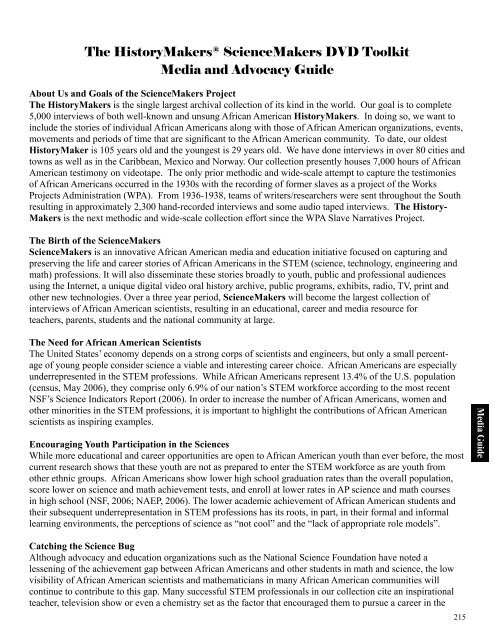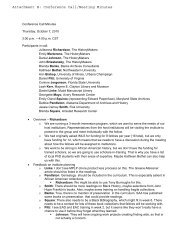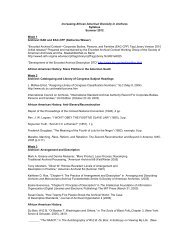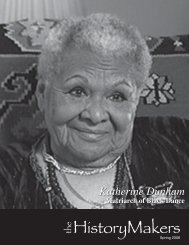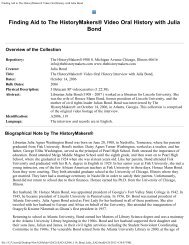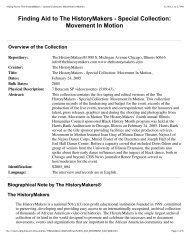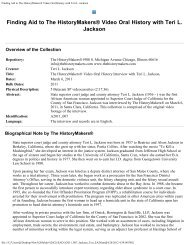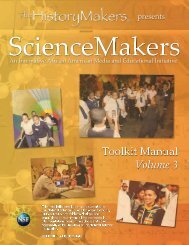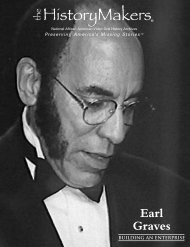ScienceMakers Toolkit Manual - The History Makers
ScienceMakers Toolkit Manual - The History Makers
ScienceMakers Toolkit Manual - The History Makers
Create successful ePaper yourself
Turn your PDF publications into a flip-book with our unique Google optimized e-Paper software.
<strong>The</strong> <strong>History</strong><strong>Makers</strong> ® <strong>Science<strong>Makers</strong></strong> DVD <strong>Toolkit</strong><br />
Media and Advocacy Guide<br />
About Us and Goals of the <strong>Science<strong>Makers</strong></strong> Project<br />
<strong>The</strong> <strong>History</strong><strong>Makers</strong> is the single largest archival collection of its kind in the world. Our goal is to complete<br />
5,000 interviews of both well-known and unsung African American <strong>History</strong><strong>Makers</strong>. In doing so, we want to<br />
include the stories of individual African Americans along with those of African American organizations, events,<br />
movements and periods of time that are signifi cant to the African American community. To date, our oldest<br />
<strong>History</strong>Maker is 105 years old and the youngest is 29 years old. We have done interviews in over 80 cities and<br />
towns as well as in the Caribbean, Mexico and Norway. Our collection presently houses 7,000 hours of African<br />
American testimony on videotape. <strong>The</strong> only prior methodic and wide-scale attempt to capture the testimonies<br />
of African Americans occurred in the 1930s with the recording of former slaves as a project of the Works<br />
Projects Administration (WPA). From 1936-1938, teams of writers/researchers were sent throughout the South<br />
resulting in approximately 2,300 hand-recorded interviews and some audio taped interviews. <strong>The</strong> <strong>History</strong>-<br />
<strong>Makers</strong> is the next methodic and wide-scale collection effort since the WPA Slave Narratives Project.<br />
<strong>The</strong> Birth of the <strong>Science<strong>Makers</strong></strong><br />
<strong>Science<strong>Makers</strong></strong> is an innovative African American media and education initiative focused on capturing and<br />
preserving the life and career stories of African Americans in the STEM (science, technology, engineering and<br />
math) professions. It will also disseminate these stories broadly to youth, public and professional audiences<br />
using the Internet, a unique digital video oral history archive, public programs, exhibits, radio, TV, print and<br />
other new technologies. Over a three year period, <strong>Science<strong>Makers</strong></strong> will become the largest collection of<br />
interviews of African American scientists, resulting in an educational, career and media resource for<br />
teachers, parents, students and the national community at large.<br />
<strong>The</strong> Need for African American Scientists<br />
<strong>The</strong> United States’ economy depends on a strong corps of scientists and engineers, but only a small percentage<br />
of young people consider science a viable and interesting career choice. African Americans are especially<br />
underrepresented in the STEM professions. While African Americans represent 13.4% of the U.S. population<br />
(census, May 2006), they comprise only 6.9% of our nation’s STEM workforce according to the most recent<br />
NSF’s Science Indicators Report (2006). In order to increase the number of African Americans, women and<br />
other minorities in the STEM professions, it is important to highlight the contributions of African American<br />
scientists as inspiring examples.<br />
Encouraging Youth Participation in the Sciences<br />
While more educational and career opportunities are open to African American youth than ever before, the most<br />
current research shows that these youth are not as prepared to enter the STEM workforce as are youth from<br />
other ethnic groups. African Americans show lower high school graduation rates than the overall population,<br />
score lower on science and math achievement tests, and enroll at lower rates in AP science and math courses<br />
in high school (NSF, 2006; NAEP, 2006). <strong>The</strong> lower academic achievement of African American students and<br />
their subsequent underrepresentation in STEM professions has its roots, in part, in their formal and informal<br />
learning environments, the perceptions of science as “not cool” and the “lack of appropriate role models”.<br />
Catching the Science Bug<br />
Although advocacy and education organizations such as the National Science Foundation have noted a<br />
lessening of the achievement gap between African Americans and other students in math and science, the low<br />
visibility of African American scientists and mathematicians in many African American communities will<br />
continue to contribute to this gap. Many successful STEM professionals in our collection cite an inspirational<br />
teacher, television show or even a chemistry set as the factor that encouraged them to pursue a career in the<br />
215<br />
Media Guide


